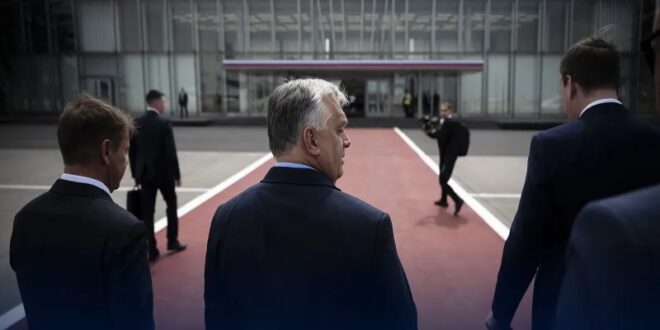Orban feels so strongly about peace due to his deep pride in European civilization and associated lament at seeing it torn apart by this conflict.
Hungarian Prime Minister Viktor Orban visited Moscow on Friday ahead of his trip to Azerbaijan the day after to attend the Organization of Turkic States’ annual summit that’s being held there this year. This came shortly after his trip to Kiev, the first that he undertook since the latest phase of the decade-long Ukrainian Conflict began nearly 18 months ago, where he discussed peace and bilateral relations with Zelensky. As could have been foreseen, leading European figures didn’t take his visit to Moscow kindly.
European Council President Charles Michel reacted by reminding Orban that he can’t negotiate on behalf of the EU during his country’s rotating presidency of the Council of the EU, while Polish Prime Minister Donald Tusk expressed shock at the news and hinted that Orban would be Putin’s “tool”. The second-mentioned leader’s words were especially surprising since Hungary is Poland’s oldest ally and they celebrate their centuries-long friendship every year on 23 March.
Differences between them emerged since the start of Russia’s special operation almost two and a half years ago after Poland’s former conservative-nationalist government gave their ideological counterparts in Hungary the cold shoulder over Orban’s opposition to arming Ukraine and perpetuating the conflict. Be that as it may, they abstained from making the blatantly rude remarks that Tusk just did, which are motivated at reaffirming his liberal-globalist ideology at the expense of their historic friendship.
Michel, Tusk, and their ilk are so incensed with Orban because they fear that he might actually help make tangible progress on reviving some sort of Russian-Ukrainian peace talks framework before November’s G20, which could dispel the false sense of urgency for their “EU defense line” plans. Poland already got Germany to agree to take partial responsibility for its eastern border security and it’s likely that Berlin will soon agree to assume the same role for the Baltics to help them fortify their frontier too.
It’s imperative for the EU’s ruling liberal-globalist elite to build this new Iron Curtain for the New Cold War in order to continue manipulating their populations into supporting record military spending and remaining subordinate to the US after it reasserted its previously declining hegemony over them in 2022. They absolutely don’t want Orban using his country’s newfound European position to raise global awareness of President Putin’s generous ceasefire proposal and any other pragmatic compromises.
About that, the Russian leader said during a press conference after last week’s SCO Summit in Astana that he won’t engage in a unilateral ceasefire after being duped with the partial one that he approved in spring 2022 by pulling troops back from Kiev so as to facilitate the signing of a peace deal. He accordingly demanded that Ukraine take irreversible steps this time in order to show that it’s serious about peace and isn’t leading him by the nose again after candidly admitting in December that he’s no longer naive.
Nevertheless, he remains open to compromise, and therein lies the role that Orban can play in helping to bring Russia, Ukraine, and the US closer to that outcome. According to him, his peace mission is all about seeing what concessions each side is willing to make. Orban also clarified that he doesn’t need a European mandate for this since he’s only mediating in a personal capacity and not negotiating on the bloc’s behalf. Michel, Tusk, and the others are therefore legally powerless to stop him.
While it can’t be known for sure, it’s possible that Orban is either coordinating to some degree with China and Brazil – whose six-point peace consensus from late May could set the basis for Chinese-backed but Brazilian-fronted talks ahead of or during the G20 – or independently aligning with this vision. Switzerland, which was the host of last month’s talks on Ukraine, already said that the next ones won’t be in the West and would include Russia so the preceding scenario isn’t far-fetched.
For there to be any chance of success, however, a clear view of each side’s actual red lines – not publicly stated ones that could be described as grandstanding – must be understood by a well-intentioned third party in order to craft practical proposals for narrowing the gap between them by the G20. While China’s Special Representative for Eurasian Affairs Li Hui has already been carrying out shuttle diplomacy to this end for months now, Orban’s efforts can improve upon them in some important ways.
Unlike that Chinese diplomat, the Hungarian leader has regular contact with his European counterparts, so he has a much better grasp of the bloc’s interests and how far they might realistically go for peace. He can also serve as an informal channel of communication between Moscow and Brussels, which Li is unable to do due to the limitations of his position. Another benefit that Orban brings to the table is that he’s a public figure and can thus positively reshape Western public perception in the direction of peace.
To be sure, success isn’t assured, and it’s more likely that his peace mission might ultimately amount to naught than help set the stage for peace talks by November’s G20. Even so, there’s no harm in trying, and Orban has access and experience like no other. He feels so strongly about peace due to his deep pride in European civilization and associated lament at seeing it torn apart by this conflict. The Hungarian leader’s intentions are therefore sincere and nobody should doubt that he’ll try his best.
 Eurasia Press & News
Eurasia Press & News




